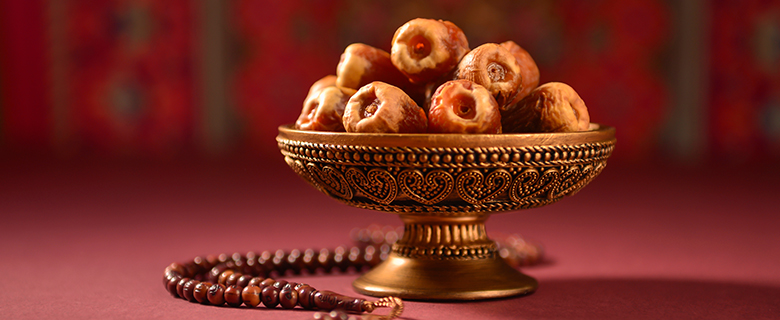
Food often has a religious significance, and many religions have foods that have strong spiritual connections, none more so than dates to Islam.
Christianity uses bread and wine in the eucharist, Hinduism believes that ghee was the sacred food of the Hindu deities the Devas, matzo bread is an integral part of Judaism’s Festival of the Passover, while followers of the Japanese religion Shintoism often leave tofu at shrines, believing that it is a favorite food of the foxes associated with the Shinto deity Inari.
But for Muslims, the date has particular importance within the religion and within the culture. The fruit is mentioned more than 20 times in the Qur’an, and takes on particular significance at Ramadan, or more specifically iftar, when it is traditionally eaten to break the fast, as practiced by Prophet Mohammed (PBUH), who reportedly said:
“When one of you breaks his fast, let him break it with dates for they are blessed. If they are not found, let him break it with water for it is pure.”
Dates are not blessed without good reason, though. The WebMD website notes that the fruits are a good source of selenium, magnesium, calcium, and copper and are an excellent source of phytonutrients – natural, plant-based compounds that may also have health benefits. They are fat-free, cholesterol-free, and sodium-free, containing vitamin A and numerous B-complex vitamins. Weight for weight, dates also contain more potassium than a banana.
Healthline.com states that dates also contain high amounts of fiber, which promotes gut health, and antioxidants which are believed to protect the body from various diseases. They can also help to keep blood sugar levels stable, particularly important during Ramadan when fasting through the day means that blood sugar falls.
It is perhaps partially for these reasons – although medically unknown at the time – that the hadith reports the Prophet saying:
“One who takes seven Ajwa dates in the morning, he remains under the protection of Allah from magic and poison for whole of the day."
Moreover, the Qur’an famously records the story of Mary giving birth to Jesus. As she is consumed by labor pains and feels she cannot continue, Allah instructs her to shake the trunk of the palm tree she is sheltering under, whereupon she is showered with dates to eat.
In the context of 21st century medicine, the consumption of dates during pregnancy and for labor can be seen to have strong scientific foundations.
WebMD cites two studies in which it was shown that eating dates can soften the cervix, making labor easier, and a second study found that eating six dates per day for four weeks before the baby is due to be born leads to a shorter initial labor stage. It has also been shown that eating dates in the last trimester of pregnancy reduces the need for oxytocin, the hormone used to induce and hasten labor.
For people who just want to break their fast, though, dates are the ideal, complete food and more than that, they help Muslims feel closer to the Prophet and Allah. Is it little wonder that the Prophet reportedly said:
“A house which has dates will never suffer hunger.”
We have books about dates in our collections! Here are some examples:
- Dates: postharvest science, processing technology, and health benefits / editor, Muhammad Siddiq; associate editors, Salah M. Aleid, Adel A. Kader.
- Dates: production, processing, food, and medicinal values / edited by A. Manickavasagan, M. Mohamed Essa, Ethirajan Sukumar.
- Dates: a global history / by Nawal Nasrallah.
The Library also has many resources for learning more about Ramadan and Islam in general.
For children and young adults
- Ramadan: the holy month of fasting / by Ausma Zehanat Khan.
- Sadiq and the Ramadan gift / by Siman Nuurali
- Welcome Ramadan! / by Lila Assiff-Tarabain
- Hassan and Aneesa love Ramadan / by Yasmeen Rahim
- Ramadan and Id-ul-Fitr / by Nancy Dickmann.
- My first Ramadan / by Karen Katz.
For adults
- Fasting for Ramadan / by Kazim Ali.
- Fasting in Islam & the month of Ramadan: a comprehensive guide / Ali Budak
The Library now has its own app, on which you can read ebooks or listen to audiobooks, anywhere you go. To download it to your phone or tablet, visit Google Play or the App Store.
e-Books
- The story of the Holy Prophet Muhammad: peace and blessings of Allah be on him / by Malik Humera.
- Ramadan / by Molly Aloian.
- Ramadan / by Sheila Anderson

Add new comment